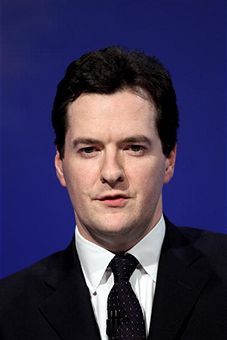 I was all set up to Fisk the post-Budget analysis which Darling normally gives to the Today programme after the Budget – but he wasn’t there. The Treasury refused to have him debate with Osborne which is what Today (unusually) seems to have assumed. Well, we’d best get used to hearing Osborne post-Budget day. At first, I thought it was a coup for the Tories – but as Evan Davis sharpened his claws, it soon appeared to have been a net negative. Osborne just didn’t sound confident. A series of exchanges left him looking unprepared.
I was all set up to Fisk the post-Budget analysis which Darling normally gives to the Today programme after the Budget – but he wasn’t there. The Treasury refused to have him debate with Osborne which is what Today (unusually) seems to have assumed. Well, we’d best get used to hearing Osborne post-Budget day. At first, I thought it was a coup for the Tories – but as Evan Davis sharpened his claws, it soon appeared to have been a net negative. Osborne just didn’t sound confident. A series of exchanges left him looking unprepared.
His line – that he will eliminate ‘the bulk’ of the annual overspend over the lifetime of the parliament – was challenged: what does it mean? How does it differ from Darling’s pledge to halve the annual overspend over the same period? It doesn’t, really. I’m sure Osborne will reduce the overspend faster, but I’m also sure Labour would have to do this as well. The markets will impose fiscal discipline on whoever is the next Chancellor. But there is a difference in what tools they would use to do this, as Osborne said. He quoted an OECD study showing that fiscal consolidation is at its most effective when done by an 80/20 mix of cuts and taxes. (Labour proposes 67/33). This was his first mistake.
Acronyms and statistics never work on a prime time radio programme – it bores most ordinary voters. Brown used them as part of his great confidence trick: the listener is supposed to think ‘I don’t understand that, probably my fault, but this chap seems to know what he’s talking about’. Before Davis came along, the interviewer was usually bamboozled too. So Brown would manage to waffle on while quoting weird statistics without challenge. But Clarke, Lamont, Lawson – none of these guys would empty a bucket of statistics in an interview. Clarke especially. The Tory response to Brown should be to speak in the vernacular not reply with more statistics. At 8.15am, this was not going to win around any swing voters.
Evan Davis jumped in: so Labour would do 67 percent cuts, the Tories would do 80 percent cuts. ‘It’s a difference, but it’s not one to get that excited about.’ Osborne said that it is a ‘quite a substantial difference’, that ‘we are not reaching for the tax lever’. But he is, but with just slightly less enthusiasm than Labour. Clegg, for example, told The Spectator that 100 percent of the deficit reduction should come from cuts. Here is a man not reaching for the tax lever. The Tories are – with, I suspect, VAT rises to 20 percent or more. In my view, they are right to. Osborne said the real problem is bloated government, poor productivity etc, and again he is right. But Davis, promoted to that programme because of his non-geeky numeracy, had a killer point: ‘It’s a £5bn difference in spending on a government spend of £622bn. Not to be sniffed at but it’s a detail, really, in truth.’
This is the point where I suspect Osborne stopped being pleased about landing the 8.10am interview slot. Davis continued. ‘Let’s call it the 1 percent of government spending that sets you apart from them’ Ouch. Osborne didn’t refute the figure, saying only that he’d set out his plans in the future.
Davis then moved on. The Tories have promised to ringfence health (unwisely) – wouldn’t that mean 16 percent cuts on non-protected departments like transport, universities, defence. (It would indeed – see Coffee House passim). Osborne said that there will be cuts whoever wins. The fundamental choice, he said, is that between a government ‘with energy, vision, leadership, ideas to get the economy moving? Or do you want what you saw yesterday – an empty budget with no energy, ideas or vision?’ A great way of phrasing it. But in his unexpected chance to address the nation post-Budget day, Osborne missed the chance to convey his energy, vision etc. And as he made his way out of the interview studio, I suspect he knew it.
This failure was crystallised when Osborne was asked for his overall verdict on the Budget. He said he’d wait to see what the IFS has to say this afternoon. But what proportion of the population know what that means? Even those who did would have thought it sounded weak. Some things should never be said out loud. The IFS’s Gemma Tetlow is a heroine, true, but the Tories would do better to hire her than admit to the world that they are waiting for her verdict.
So how has Osborne played it? Read The Sun today: it’s a case study in how to say in thirty words what other newspapers struggle to say in a thousand. As Tom Newton Dunn puts it: “The Budget could be summed up in four words: spend now, pay later. Only he is spending now, and YOU are paying later”. Kavanagh’s column has another arsenal of verbal bullets.
There are a thousand ways to nail Brown over the budget and the finances. Talking about a AAA credit rating and an OECD report and an 80/20 tax mix is not the way to do it.







Comments